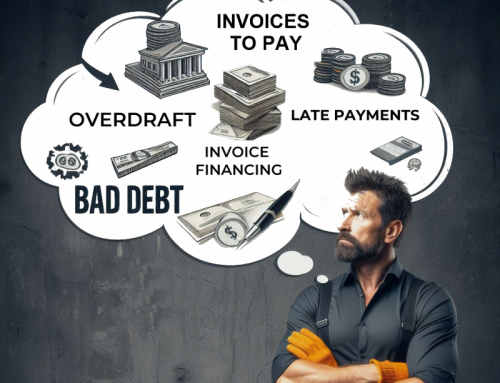Never has cashflow been more important for small businesses. With cost pressures continuing to increase, the cost of producing goods and providing services are increasing. In order for businesses to pay their teams, meet rent commitments and pay suppliers, businesses need to be paid on time. Both product based and service based businesses are impacted.
Are you owed more than $7,000 right now? A 2019 Xero report detailed that 50% of Kiwi businesses are owed at least that amount. While that might not be an issue for a larger operator, for sole traders and small businesses, this can be the difference between meeting office rent payments or skipping your hard earned salary that month. And skipping salary payments generally means it’s your family that suffers.
Debt recovery is the process of making sure people pay back money owed. Overdue invoices and late payments are begrudgingly accepted in the business world, but when does a late payment turn into debt collection? What are you entitled to do to rectify an overdue invoice? Is it a process that is managed in house by a director, spouse, accounts person or receptionist? Or is debt recovery best managed by an external professional? This article will examine the options available to your business.
Small business debt collection laws
The Commerce Commission clearly outlines your obligations for debt collection or debt recovery. If your business has an outstanding debt with a consumer, you need to comply with Aotearoa New Zealand consumer law.
The key law you need to abide by is the Fair Trading Act 1986. This legislation ensures that you do not make false or misleading representations when you go to collect a debt. In other words, you cannot:
- Imply you have done something if you have not (e.g. filed court proceedings for the debt if you haven’t in fact done this),
- Say that you’re going to do something if you intend not to do it (e.g. say you’ll file court proceedings if you don’t intend to),
- Provide debt collection documents that look like court or other official notices.
Harassment and coercion is also not allowed under Aotearoa New Zealand consumer law. Examples include:
- Misrepresentation about how you will deal with the debt,
- Threatening your debtor,
- Contacting your debtor too frequently,
- Contacting your debtor outside business hours,
- Demanding payment from a debtor when you know they have no ability to pay you.
You can initiate the debt collection process after a “reasonable period of time”. Bear in mind that after six years you can no longer recover a debt.
What are the 3 key strategies when it comes to collections?
If you’re looking to implement a debt recovery strategy into your business, or review a current debt collection strategy, the first thing to ensure is that you have clear terms of trade in place. For product based businesses you should request payment of goods before they’re sent. If you do have a line of credit available, you can seek payment guarantors. For service based businesses, clearly state when invoices are due and what steps you’ll take if invoices are late. These are basics to include in initial contracts and agreements and remind your customers of these terms on their invoices. When it comes to implementing a debt recovery strategy, there can be no doubt on your expectations when it comes to payments.
Early warning signs for a debtor include a change in payment activity (delayed payments, under payments, excuses for non-payments, inability to contact a customer etc).
1. Demand payment for overdue invoice
A debtor must be made aware that an invoice is outstanding. Some accounting systems automate this process for you with reminders for payment every few days. These reminders should be brief and polite, and may involve multiple communication methods: email, phone follow up, email again. Consider offering a payment plan whereby you split the payment over multiple months – this may not be ideal, but can help your cash flow and can ensure the entirety of the debt is repaid.
This first step in debt collection can usually be managed in house, by a customer’s account manager, a senior manager in the business or a confident accounts person.
A debtor must be given a reasonable period of time to respond to your query and confirm when they will pay. If you don’t hear back from a debtor or you’re unhappy with their response, you can move onto the next stage.
2. Obtain an order for payment
If it becomes clear that an invoice won’t be paid, businesses have two options: sell the debt to a debt collection agency to follow up, or take the debtor to court.
Considerations for engaging a debt collection agency include:
- Understanding their fees and assessing whether it’s worth your while to engage an external party to follow up your bad debt.
- A debt collection agency can take on the time consuming and stressful task of recovering the debt off your team’s to do list.
- A professional debt collection agency will be aware of their legal obligations and ethical standards they must adhere to in recovering your debt successfully.
Considerations for taking a debtor to court:
- Amounts owing under $30,000: providing the amount owing is not in dispute, most unpaid debts would go to the Dispute Tribunal. This is an online process and does not require legal representation
- Amounts owing from $30,001 to $350,000: this level of debt would be taken to the District Court. A statement of claim must be filed with the court and served to the debtor.
- Amounts owing over $350,000: this level of debt would be taken to the High Court.
- Be aware of timeframes: District Court proceedings can take at least 3 months, High Court proceedings can take up to a year to be heard.
- Does the debtor have the ability to repay? You may decide it’s not worth the time, effort and expense to progress court proceedings if you know your debtor cannot repay the debt.
- You will likely need to have legal advice at this point, so consider the costs this might entail for your business.
Once an order is made through the Dispute Tribunal or either court, the order for repayment of the debt becomes legally enforceable.
3. Enforcing an order for payment
A court registrar can examine the debtor’s ability to repay their debt and order a repayment schedule, against assets or income. If a debtor is not cooperative, an order for liquidation or bankruptcy can also be made. Note that a court-ordered debt repayment will have higher priority than an unsecured creditor if your debtor was to go into liquidation, or be declared bankrupt.
If you’re keen to avoid the need for debt recovery altogether, then the IPromise app with its guaranteed customer payments can be a game changer. The reassurance that you’ll be paid immediately after the agreed job is completed can enable you to get on with doing the parts of the business you really enjoy. We’re yet to meet anyone that lives for accounts receivables!
Whether you work in Professional Services, Construction, Consulting, Manufacturing, or any other service-based industry, IPromise will add payment security, improve cash flow, reduce administration time and enable open, easy communication for your projects.






Leave A Comment